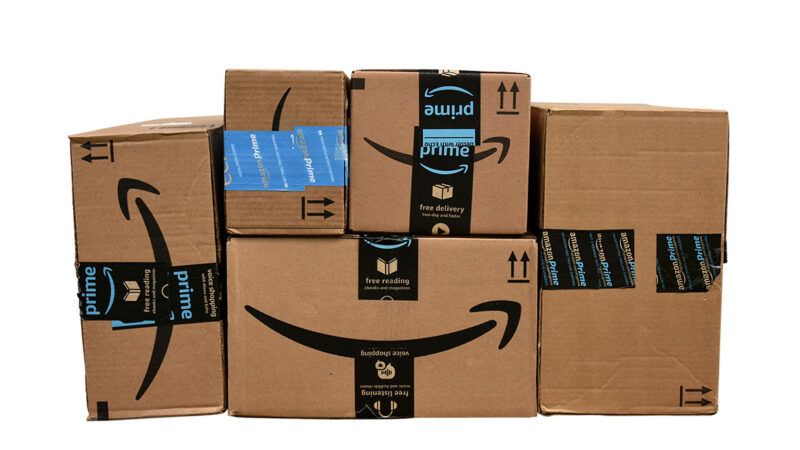Congress Targets Amazon, Apple, Facebook, and Google for Being Popular
After a 16-month investigation into the big four tech companies, it seems the most that congressional busybodies can accuse them of is routine business practices and having popular services.

With fresh faces in the White House and Congress, many Trump-era political agendas will soon be discarded. But the desire to use antitrust law against popular tech companies isn't likely to go anywhere. In recent months, Republicans and Democrats have both been itching to flex their regulatory muscle against the likes of Google, Facebook, Apple, and Amazon.
In October, 11 state attorneys general—all Republicans—and the Department of Justice filed a civil suit against Google, accusing the internet search giant of maintaining a digital search and ad monopoly "through anticompetitive and exclusionary practices," in violation of the Sherman Antitrust Act. But the lawsuit fails to explain either how Google's practices amount to anything other than normal business deals or how consumers are being harmed.
The bar for showing consumer harm "is unlikely to be met," said Jessica Melugin, associate director of Center for Technology and Innovation at the Competitive Enterprise Institute, in a statement about the lawsuit. That's "why so many antitrust enthusiasts are calling for a fundamental rewriting and expansion of U.S. antitrust laws. Those proposed changes sacrifice the primacy of consumer welfare and insert competitors and broader socio-economic goals in its place."
This impetus was on full display in a fall report from the House Subcommittee on Antitrust, Commercial, and Administrative Law. After a 16-month investigation into the big four tech companies, it seems the most that congressional busybodies can accuse them of is routine business practices and having popular services. But while the 450-page report, issued in October, offers scant evidence of these companies violating current federal law, it's full of calls to change the law so tech company actions will fall under federal purview.
The subcommittee's bipartisan "Investigation of Competition in Digital Markets" included seven additional hearings, hundreds of interviews, and nearly 1.3 million obtained "documents and communications." For all that work, the members found little that's not already public knowledge and even less to suggest these companies acted in an illegal way.
The report repeatedly accuses Amazon, Apple, Facebook, and Google of having "monopolies" in various facets of digital life. But it uses this term to mean not having exclusive domain over a product or service but merely enjoying large market shares thanks to consumers choosing to use them.
For instance, the report faults "the strong network effects associated with Facebook" for tipping "the market toward monopoly." Network effects refers to the fact that the more people who are on a particular platform, the more value it holds for users—a phenomenon driven by individual choices and calculations, not anti-competitive action or a lack of alternatives. (Also notable: Facebook's share of social media traffic has actually been declining for a few years.)
The subcommittee faults Google because "a significant number of entities…depend on Google for traffic"—as if Google is doing something wrong by building a search engine that millions of people choose to use, thereby making it a significant traffic source for sites across the web.
The report faults Amazon for things like having "significant and durable market power in the U.S. online retail market" and preferentially listing its own brands in search results among products from millions of third-party sellers. It faults Apple for pre-installing its own apps on iPhones and iPads and for running an app store that gives users access to outside apps, suggesting that this is "controlling access to more than 100 million iPhones and iPads."
It's one of the report's many misrepresentations about how technologies work and whom they benefit. Without an app store, consumers would have to tediously trawl the web for each new app they wanted to access—almost ensuring that now-dominant names would become even more dominant. New or small offerings now discoverable through the centralized app marketplace would be far less visible or would have to spend far much more on marketing. The app store may benefit Apple, but it also benefits Apple customers and independent app developers.
"Last year in the United States alone, the App Store facilitated $138 billion in commerce with over 85 percent of that amount accruing solely to third-party developers," Apple said in a statement, pointing out that the company "does not have a dominant market share in any category" where it does business.
Google accused the report of being out of touch with what consumers want while containing "outdated and inaccurate allegations from commercial rivals about Search and other services."
Amazon also objected to the subcommittee's "regulatory spit-balling on antitrust," writing in a blog post that "large companies are not dominant by definition, and the presumption that success can only be the result of anti-competitive behavior is simply wrong."
Calling Apple, Amazon, Facebook, and Google monopolies only works if we're departing from traditional definitions of the word and its historical meaning in antitrust law. The report calls this redefinition a modernization.
"Congress must lead the path forward to modernize [antitrust laws] for the economy of today," wrote subcommittee chair David Cicilline (D–R.I.) in the report's introduction, which also spells out Congress' intention to more aggressively enforce those laws. "These firms have too much power, and power must be reined in," wrote Cicilline.
The report recommends a wide swath of changes, including prohibiting "dominant platforms from operating in adjacent lines of business" and creating new presumptions against tech acquisitions. At the progressive magazine The American Prospect, David Dayen suggested gleefully that subcommittee members are "using tech as simply a case study on what an invigorated legislative body can do to rein in the corporate power of any type."
